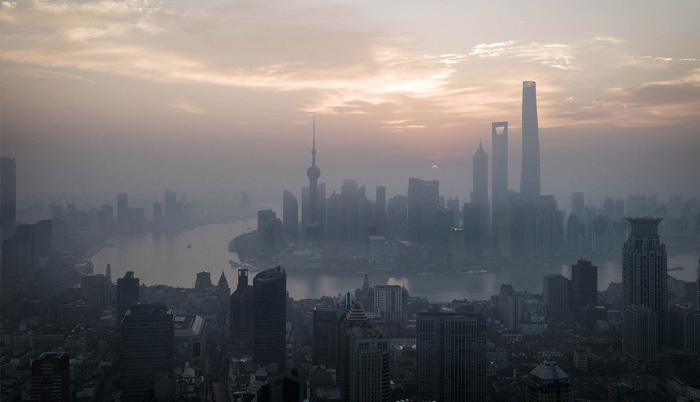![]() Home > World Business
Home > World Business
A Sense of Calm Has Descended on China's Markets. Don't Fall for It

Photographer: Fred Dufour/AFP via Getty Images
![]() July 17th, 2017 | 09:36 AM |
July 17th, 2017 | 09:36 AM | ![]() 1351 views
1351 views
CHINA
A sense of calm has descended on China’s markets after a flurry of activity from financial regulators. While it’s emboldening investors, analysts are waiting for the storm.
Liquidity has come roaring back after a dry spell during April and May, when President Xi Jinping ordered a check of China’s financial system and an intensified focus on deleveraging saw mainland debt and equities sell off. That, coupled with what seems like a lull in Beijing’s regulatory fervor, has sparked a resumption in corporate bond buying and a return to borrowing as speculation takes hold that the worst of the crackdown may be over.
To market watchers from Pacific Investment Management Co. to Australia & New Zealand Banking Group Ltd. and Standard Chartered Plc that’s a concern -- not least because the efforts so far have barely budged leverage levels.
“The market should be more cautious, as such complacency is not what policy makers want to see,” said Ding Shuang, chief China economist at Standard Chartered in Hong Kong. “The government won’t easily give up on deleveraging. It still has a way to go.”
Xi said at a two-day National Financial Work Conference ended Saturday the central bank will play a stronger role in defending against risks, calling for more work on safeguarding the financial system and modernizing its regulatory framework. Authorities will proactively prevent and resolve systemic financial risks, and step up efforts to reduce leverage in the economy, the official Xinhua News Agency reported, citing Xi’s comments at the gathering.
With the economy in recovery mode, China has set its sights on tackling a shadow banking sector that’s flourished amid a wider increase in overall debt. That’s taken the form of clampdowns on everything from wealth-management products and property investing to stock speculation and illegal trading.
Since the start of June, however, the banking regulator has largely been quiet, and the People’s Bank of China has acted to bolster liquidity after aggressively driving up money-market rates at the start of the year.
That doesn’t mean their work is done, and authorities are just assessing their progress, says Gene Frieda, a global strategist at Pimco in London.
Deleveraging hasn’t really begun if China’s end-game is to cut total credit, so it’s likely to ramp up again once the twice-a-decade Communist Party Congress concludes later this year, he said. What’s more, Frieda suggests the market may underestimate Beijing’s intentions.
“If there’s complacency, it’s around having mistaken shadow banking system deleveraging as the end goal, rather than control of total leverage,” he said. “If the latter is the target, then Chinese aggregate credit growth is set to slow more sharply in late 2017, which in turn would potentially unsettle markets globally.”
Meanwhile, market players are focused on the here and now. Government bond yields and money-market rates have fallen from multi-year highs and local firms like Citic Securities Co. and China Merchants Securities Co. were recommending investors buy debt again.
Yields on three-year AAA rated corporate bonds have dropped half a percentage point from a two-year-high reached mid-May, just after the communication from regulators on deleveraging was at its most intense. The borrowing cost was at 4.5 percent on Friday, according to ChinaBond data.
This means the market could be set for a shock, with the next round of moves potentially “more drastic” than anticipated, says David Qu, a market economist at ANZ in Shanghai.
“The market appears to be quite confident that it could force policy makers to ease when there’s volatility,” he said. “This isn’t normal and I’m sure the government has noticed this inclination.”
Some seem to have registered that possibility and are preparing for an uptick in interest rates. Chinese companies are picking up the pace of bond issuance, which may indicate they are locking in lower borrowing costs while they still can.
Small cap stocks slumped last week, while shares in large companies surged, suggesting investors may have been shifting to safer bets on concern about renewed deleveraging zeal, according to KGI Securities Co. The mainland market -- which copped the brunt of the selloff in April and May as local traders shifted to offshore Chinese equities -- missed out on a rally last week as the Hang Seng China Enterprises Index jumped the most since November.
Mindful of the reaction to the first round of deleveraging, the authorities may well try and be more sensitive going forward, says Song Yu, chief China economist at Beijing Gao Hua Securities Co., Goldman Sachs Group Inc.’s mainland joint venture partner.
“For the rest of this year, the government will put its foot on and off the brake as needed when it comes to credit, but they probably won’t push it down as far as they did in the first quarter,” he said. “Policy makers will offer an amount of liquidity that’s just enough to maintain healthy growth, but they definitely won’t pump in more gas to boost borrowing.”
Source:
courtesy of BLOOMBERG
by Bloomberg News
If you have any stories or news that you would like to share with the global online community, please feel free to share it with us by contacting us directly at [email protected]